This website uses cookies so that we can provide you with the best user experience possible. Cookie information is stored in your browser and performs functions such as recognising you when you return to our website and helping our team to understand which sections of the website you find most interesting and useful.
15 December 2023
Cristina Gamboa, CEO, WorldGBC
It’s now been a couple of days since the UN Climate Summit COP28 negotiations in the United Arab Emirates finally closed and the world’s first Global Stocktake concluded.
After painstaking back and forth on the text for fossil fuels, the final agreement has been hailed as a signal of the “beginning of the end” for the fossil fuel era.
The World Green Building Council (WorldGBC) welcomes this historic moment, where for the first time, the UN climate summit has concluded with a call to address the main cause of the climate crisis – fossil fuels.
The language, committed by 198 nations which agrees to “transition away from” fossil fuels, is not as strong as what our network of 75+ Green Building Councils (GBCs) and partners have campaigned for, and our sector is certainly feeling some frustration about loopholes that could potentially be exploited.
However, this means it is now up to countries and industry to deliver an ambitious response to the Global Stocktake, and that’s exactly what our network is already doing!
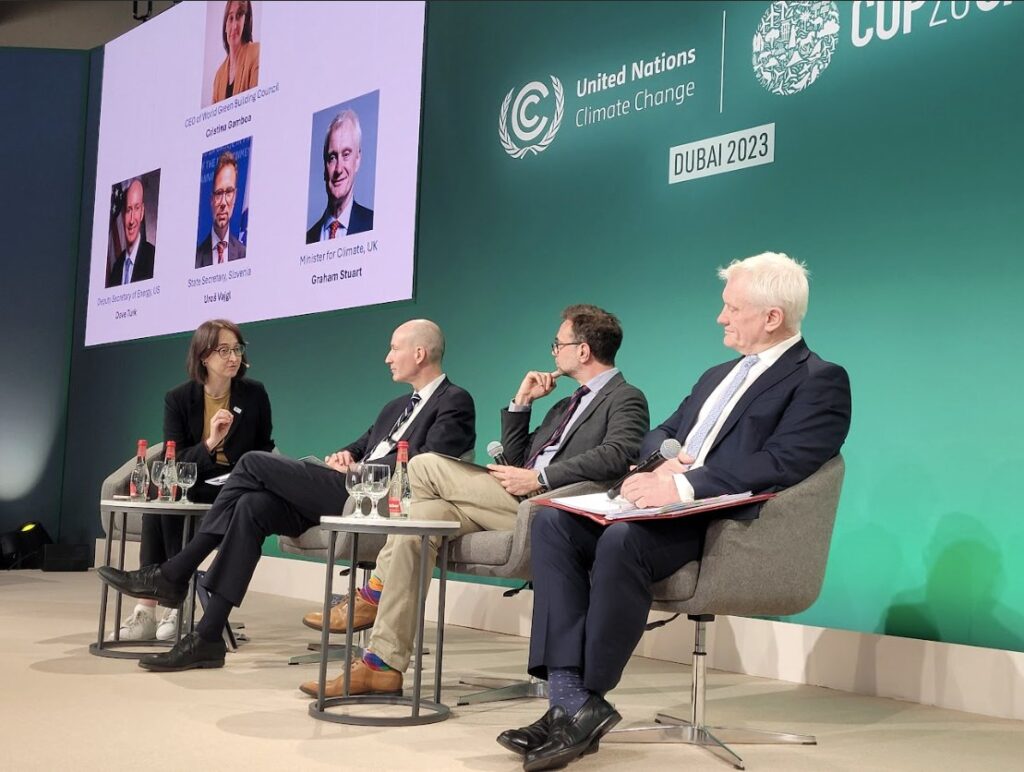
Pictured (left to right): Cristina Gamboa (CEO, WorldGBC), Dave Turk (US Deputy Secretary of Energy), Uroš Vajgl (Slovenia State Secretary), Graham Stuart (UK Minister of State for Energy Security and Net Zero), Breakthrough Agenda Ministerial, COP28.
The UAE Consensus: an even stronger mandate to decarbonise the built environment
The agreed text, called the ‘UAE Consensus,’ marks not only a first in its call for a move away from fossil fuels, but also includes a new specific target to triple renewables and double the rate of energy efficiency by 2030. Such results essentially represent an unequivocal mandate to decarbonise the building and construction sector.
This is something WorldGBC expressly campaigned for through our own advocacy work ahead of COP28, and also in partnership with the IEA and Mission Efficiency. This will be a key trigger driving investment and action on energy efficiency in buildings, yielding huge emissions savings from (what should be) our first fuel, energy efficiency.
On the adaptation side, a key outcome is the “framework” which aims to guide nations in their efforts to protect people and the environment from the impacts of climate change. This represents some progress towards delivering the “global goal on adaptation” (GGA), which WorldGBC has called for to ensure that the visibility of mitigation and adaptation was equal within the UN climate process.
The conclusion of the Global Stocktake also points towards greater action in Nationally Determined Contributions (NDCs) which are due to be presented ahead of COP30 in Brazil. Parties are being asked to strengthen the 2030 targets via ambitious, economy-wide emission reduction targets, covering all greenhouse gases and sectors.
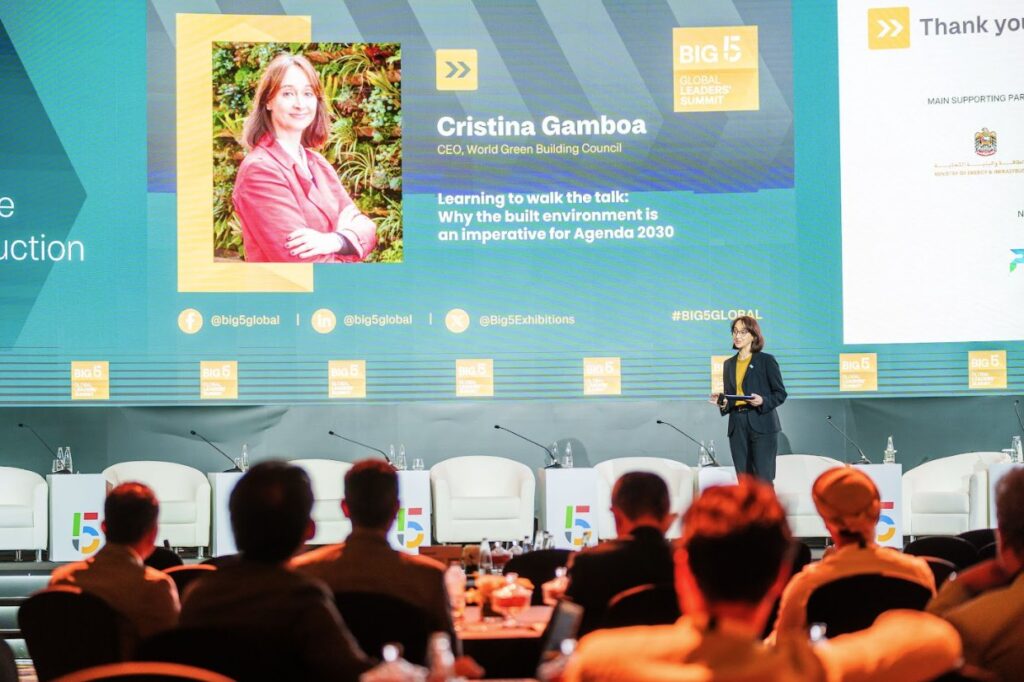
Pictured: Cristina Gamboa (CEO, WorldGBC), Big 5 Global Construction Leader’s Summit, COP28.
Building confidence at COP28 and beyond
WorldGBC arrived at COP28 with one message – a message of confidence – confidence to governments and businesses that our network of Green Building Councils and partners can make the transition to an energy efficient, regenerative and just future a reality, and already have the solutions to do so.
We brought this message to over 30 built environment events hosted at Dubai during the two weeks of COP28, elevating our sector’s critical role in the transition to a resilient and zero emissions future.
Under our campaign #BuildingTheTransition we stood united, and demonstrated the strength of our sector with 360+ organisations, (including all Green Building Councils) from across our global network, signing our Open Letter to political leaders and policymakers at COP28, with a call to action to step up and deliver the regulatory change the world needs.
Through this joint action, we showcased the collective confidence in our network on the potential of the built environment to tackle global heating, whilst showcasing the solutions being implemented by our network.
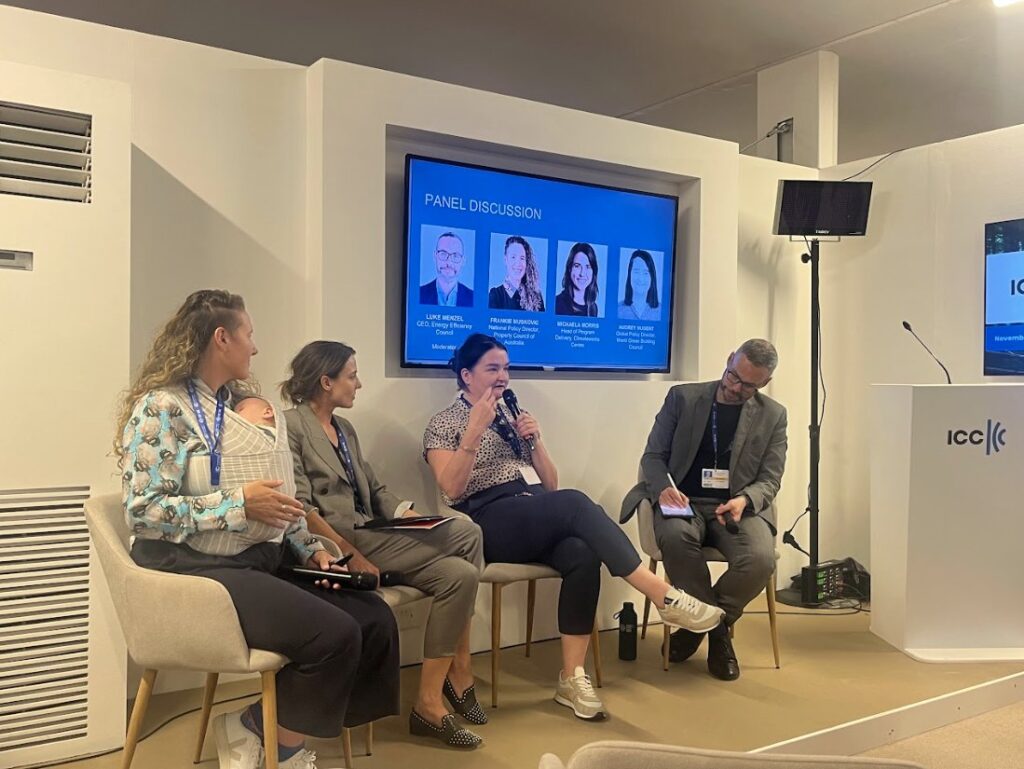
Pictured (left to right): Frankie Muskovic (Property Council of Australia), Michaela Morris (Climateworks Centre), Audrey Nugent (WorldGBC), Luke Menzel (Energy Efficiency Council), Every Building Counts – unpacking Australian leadership in decarbonising buildings, COP28.
And whilst we were at COP28, we received news that politicians in Europe are starting to gain confidence in the power of our network to deliver ambitious policy, as co-legislators agreed on a revision to the Energy Performance of Buildings Directive (EPBD). This is the most important piece of legislation regulating the environmental impact of the EU’s built environment.
This represents huge progress which our GBCs and partners in our Europe Regional Network have long called for. Finally we have a policy framework that tackles the full life cycle of buildings, and we have mobilised cross-party political support for this via the #BuildingLife campaign.
We are thrilled to see the EU policymakers taking notice of our recommendations, particularly on energy efficiency standards and definitions of zero emissions buildings, and of course Whole Life Carbon reporting. These decisive policy outcomes will support our efforts to deliver on the ‘UAE Consensus’ and the requirements of the “Buildings Breakthrough” endorsed by 28 countries and 19 initiatives, including WorldGBC´s Building Life initiative and the Net Zero Carbon Buildings Commitment (NZCB).
WorldGBC and all of its network welcomes the Buildings Breakthroughs which calls for making near zero and resilient buildings the new normal by 2030. Progressing the coalition will require implementation of solutions through local action on the ground, and this is exactly what our 75+ Green Building Councils (GBCs) across the globe are primed to do: growing the demand for sustainable buildings whilst developing and implementing decarbonisation roadmaps.
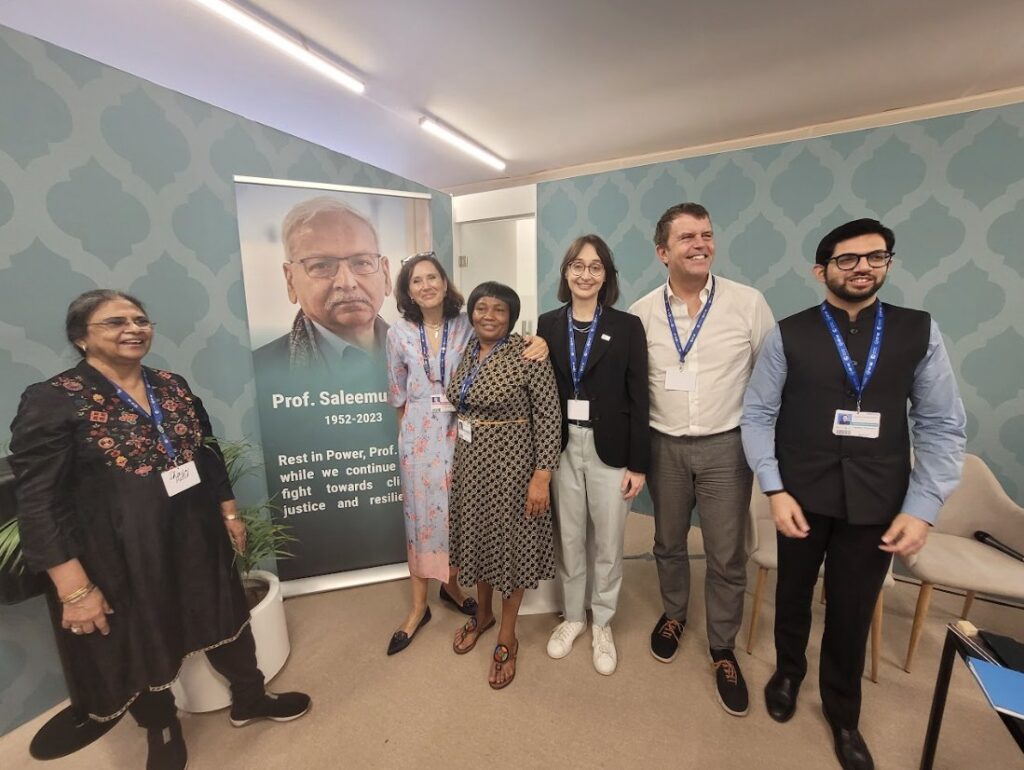
Pictured (left to right): Sheela Patel (Roof Over Our Heads), Sandrine Dixson-Declève (Club of Rome), Christine Mwelu (Slum Dwellers International), Cristina Gamboa (WorldGBC), Nigel Topping (COP27 High-level Climate Champion), Aditya Thackeray (elected representative from Worli, Mumbai to Maharashtra State Assembly), ROOH event in Resilience Hub, COP28.
Looking ahead
The Global Stocktake outlines a “road map to mission 1.5C” run by the presidencies of COP28, COP29 and COP30 (UAE, Azerbaijan and Brazil). Stimulating the required action and ambition to deliver on this roadmap is our collective responsibility and one we are ready to deliver.
In support of this, we are launching our strategic shift in March 2024 alongside our Advocacy in Action Programme, which will involve the expansion of our GBC decarbonisation roadmaps, and working with our network to build on the policy outcomes needed at COP29 and COP30.
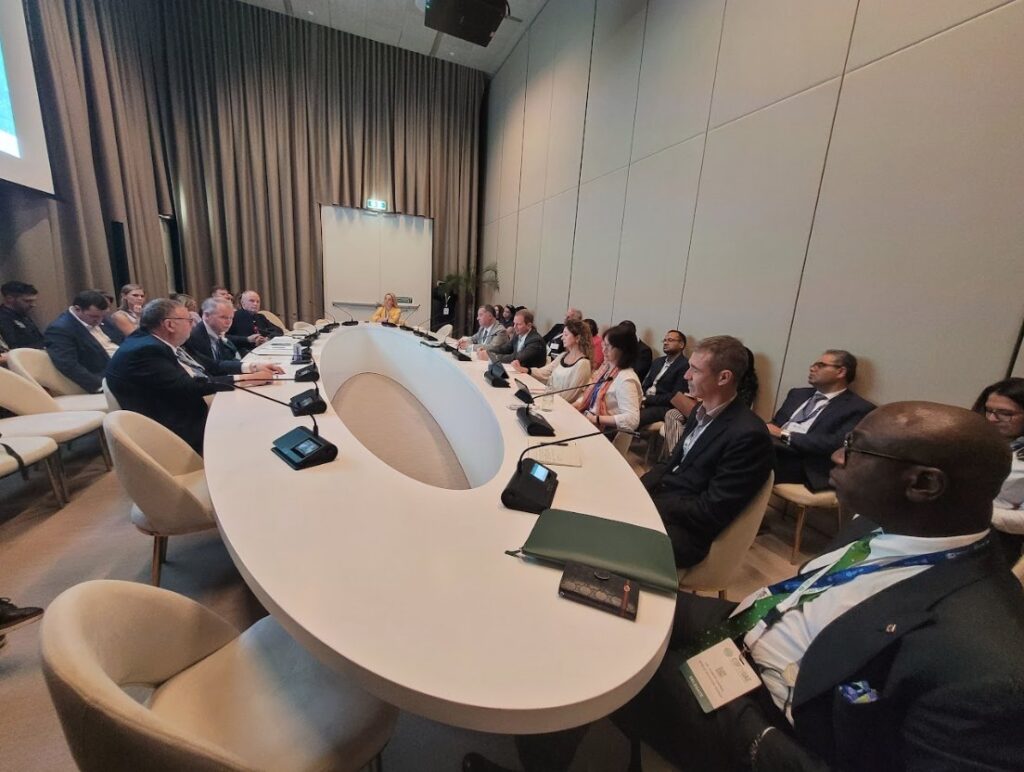
Pictured: C-Suite roundtable, “Scaling up Innovation in the Built Environment: a Blueprint for Net Zero,” Business and Philanthropy Forum, COP28.
Calls to action
Endorsing and advocating the calls to action within WorldGBC’s policy briefing is one of many ways that governments, businesses and finance can get involved in our #BuildingTheTransition campaign at COP29 and COP30.
I encourage you to read closely and identify where you can have an impact, both by taking action yourself and spreading this message with your networks.
Governments
- Partner with your local Green Building Council.
- Use our network’s “Global Policy Principles for Sustainable Built Environments” as guidance to develop building policies that accelerate a sustainable transition.
- Read our COP28 Policy Briefing to find out how Green Building Councils are influencing the negotiations at COP.
Businesses
- Partner with your local Green Building Council.
- Take accelerated action to decarbonise your buildings and business now by:
- Joining a climate initiative such as our Net Zero Carbon Buildings Commitment and the UN’s Race to Zero.
- Set near term targets by 2030 and long term targets by 2050 (at the latest).
- Publicly report and publish data and decarbonisation progress.
- Read WorldGBC’s “Beyond the Business Case” report to understand why you can’t afford not to invest in a sustainable transition.
Finance
- There is a gulf of sustainability practices and policies between the built environment industry and the finance sector – the two sides need to talk to each other (better) to get the money flowing.
- Contact your local Green Building Council to help bridge the gap between industry, finance sector and regulation in the country you operate in.
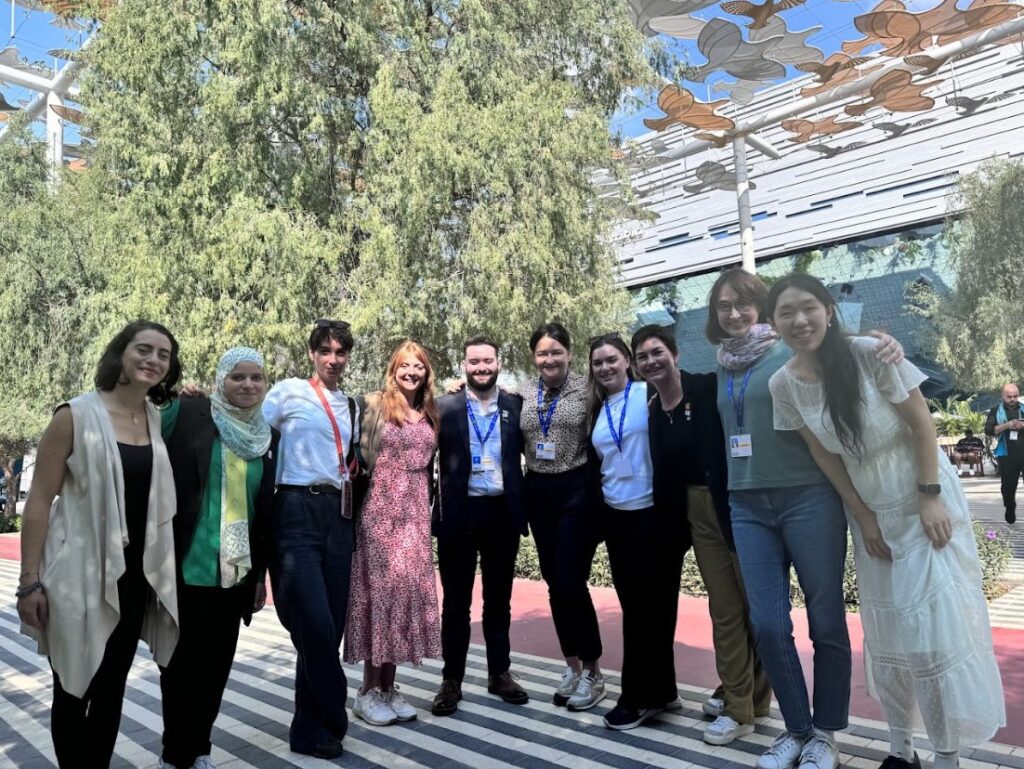
Pictured: WorldGBC team at COP28.
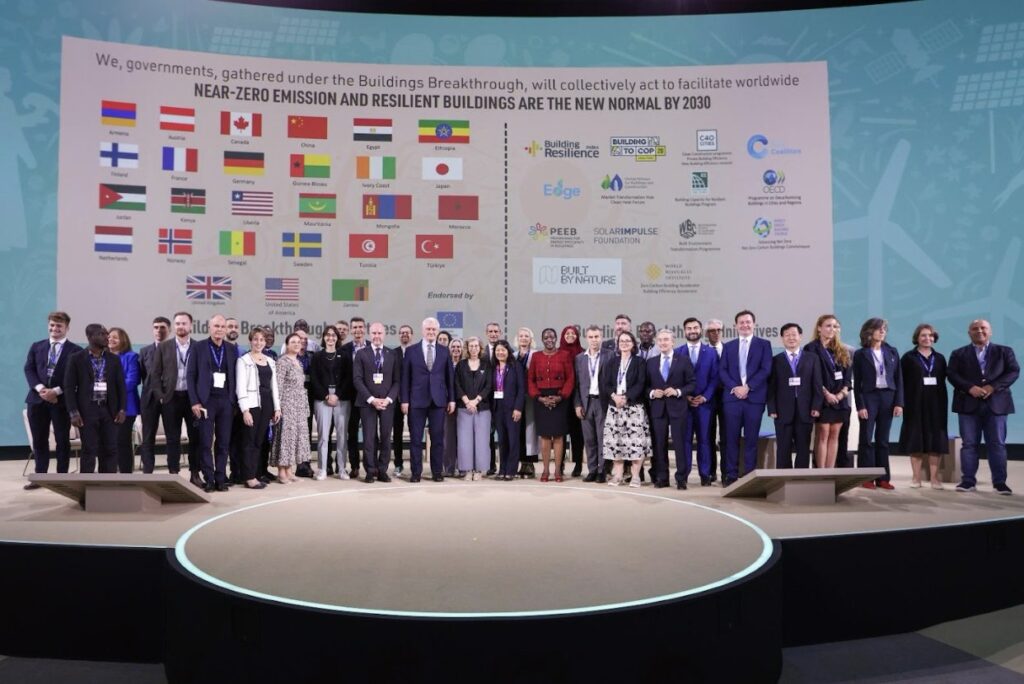
Pictured: representatives of Buildings Breakthrough governments and supporting initiatives at COP28.
Related Articles
Thought Leadership
Thought Leadership
Building and construction sector show collective force at COP28 as over 350 industry leaders sign Open Letter to negotiators and heads of states demanding the regulatory change needed to tackle the #climatecrisis
06 Dec 2023
Thought Leadership
Thought Leadership
Taking Action! WorldGBC and climate leaders welcome the Buildings Breakthrough
07 Dec 2023
